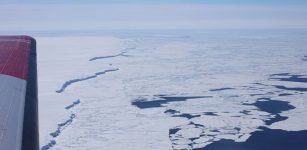Record Highs In North Sea: German Bight Reaches Warmest Temperature Ever
Eddie Gonzales Jr. – MessageToEagle.com – Ocean temperatures globally have reached record highs, with the North Sea experiencing dramatic increases in 2023.
Data from the Alfred Wegener Institute’s “Helgoland Reede” time series shows recurring marine heatwaves in the German Bight.
The research cutter Aade on the Heligoland roadstead during the anniversary sampling on 17 September 2012 (Photo: Folke Mehrtens)
These high temperatures and extreme weather events, driven by climate change, could significantly impact ecosystems.
Last year, ocean temperatures reached record highs, including in the North Sea, according to experts from the Biological Institute Helgoland at the Alfred Wegener Institute.
The warming trend continues in 2024, with January through April ranking among the top 10 warmest months since 1962. March 2024 set a record as the warmest March, with a mean water temperature of 6. 9°C. The Helgoland Reede time series data shows that 2023’s mean water temperature was nearly 11. 9°C.
Since 1962, the most detailed long-term monitoring of the North Sea has been running daily at the “Helgoländer Reede”. For more than 60 years, AWI researchers have been sailing a research vessel from the port of Heligoland into the open North Sea and taking water samples. (Photo: Esther Horvath)
Dr Inga Kirstein, a researcher at the BAH said that in 2023 was a record-breaking year since the beginning of our time series in 1962
This started in January, the second-warmest on record at about 7. 2 degrees. Though not record-breaking, September 12 had 2023’s highest water temperature at 19. 5 degrees, as measured by AWI experts.
AWI researchers analyzed North Sea surface temperatures from 1962 to 2018 using Helgoland Reede data. They found marine heatwaves occurred before 2023, not just in summer but in all seasons, including winter, when water temperatures significantly exceeded normal values.
The data showed that unusually high temperatures now occur earlier in the year.
Prof Karen Wiltshire, BAH Director, notes significant temperature increases in the German Bight since the 1990s. Data reveals a link between German Bight and mainland temperatures, with marine heatwaves occurring more frequently in late summer, during or after atmospheric heatwaves. This suggests a connection between ocean and atmospheric temperatures.
Experts attribute climate change and global warming to rising sea-surface temperatures and more frequent marine heatwaves.
Effects on ecosystems
What do these findings mean for the North Sea and its ecosystem?
Rising sea temperatures and marine heatwaves trigger biological responses. These events affect both upper water layers and seafloor habitats due to coastal water mixing. The North Sea has already experienced decadal changes in species occurrence and community composition. Temperature is a key driver of biodiversity and species distribution in this context.
“Marine organisms respond to climate change in various ways. Our research examines how marine heatwaves affect the planktonic food web, including changes in plankton community composition and species abundance,” according to Inga Kirstein.
AWI research shows that warming, acidification, and altered food availability affect plankton dynamics, favoring smaller species. This impacts marine food webs, as plankton is a key food source. Rising temperatures and more frequent marine heatwaves in recent decades have led to fundamental changes in the German Bight, raising ecological and societal concerns.
Papers:
Luis Giménez, Maarten Boersma and Karen Wiltshire. “A multiple baseline approach for marine heatwaves.” Limnology and Oceanography (2024). doi.org/10.1002/lno.12521
Felipe de Luca Lopes de Amorim, Karen Wiltshire, Peter Lemke, Kristine Carstens, Silvia Peters, Johannes Rick, Luis Gimenez, Mirco Scharfe (2023). Investigation of marine temperature changes across temporal and spatial Gradients: Providing a fundament for studies on the effects of warming on marine ecosystem function and biodiversity. Progress in Oceanography 216. doi: https://doi.org/10.1016/j.pocean.2023.103080
Moreno, H.D., Köring, M., Di Pane, J., Tremblay, N., Wiltshire, K.H., Boersma, M., et al. (2022). An integrated multiple driver mesocosm experiment reveals the effect of global change on planktonic food web structure. Communications Biology 5(1), 179. https://doi.org/10.1038/s42003-022-03105-5
Written by Eddie Gonzales Jr. – MessageToEagle.com Staff Writer












